Show us your pneumatic spud gun! Discuss pneumatic (compressed gas) powered potato guns and related accessories. Valve types, actuation, pipe, materials, fittings, compressors, safety, gas choices, and more.
-
jackssmirkingrevenge
- Five Star General

- Posts: 26216
- Joined: Thu Mar 15, 2007 11:28 pm
- Has thanked: 576 times
- Been thanked: 347 times
Fri Mar 25, 2011 2:23 am
Following
this thread, I've done some more research and it seems pneumatic mortars were actually quite commonplace in the trenches of WWI. There are quite a few listed
here, the description is in French but google translate gives a good idea of the workings.
50 mm Pneumatic mortar Dormoy-Chateau: the mechanism appears to be a cap over the muzzle which allows the barrel to be pressurised, and the device is then fired by disengaging the sear holding the cap in place.
60 mm Pneumatic mortar Brandt: A coaxial pneumatic with an exaust valve that is actuated with a cam on a lever as opposed to a pneumatic pilot.
86 mm pneumatic mortar Boileau-Debladis: fired at a predetermined pressure using a pop-off valve to fire the projectile directly.
120 mm pneumatic mortar Brandt-Lhuillier: No indication of how this works but construction appears to be similar to the "valveless"
luftminenwerfer designs.
These designs are new to me but I don't claim to have rediscovered them for the spudding community as it turns out they also appear on the
French spudgun forum - with such a pedigree it's no surprise they come up with some great launchers

-
Attachments
-
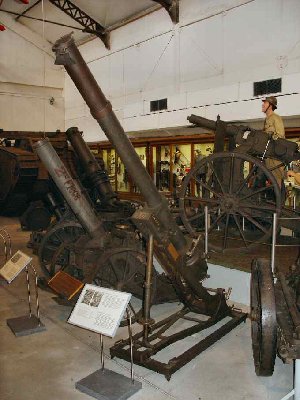
-
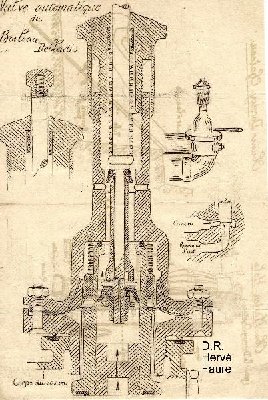
-
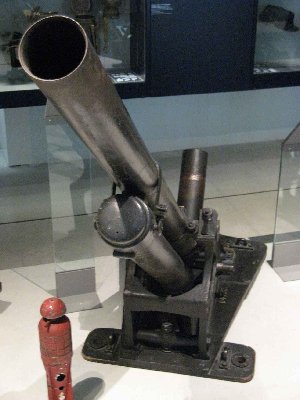
-
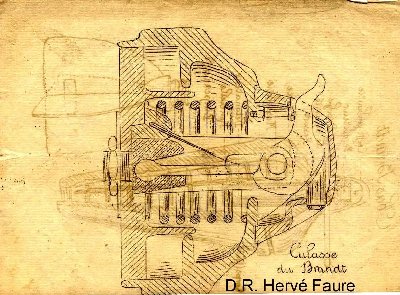
-
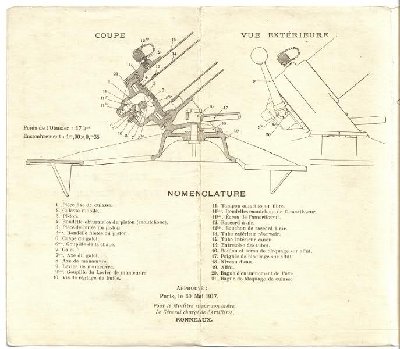
-
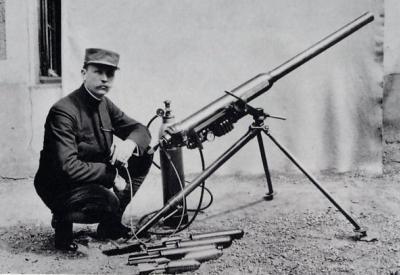
- 60mm brandt mortar.jpg (21.25 KiB) Viewed 26261 times
-
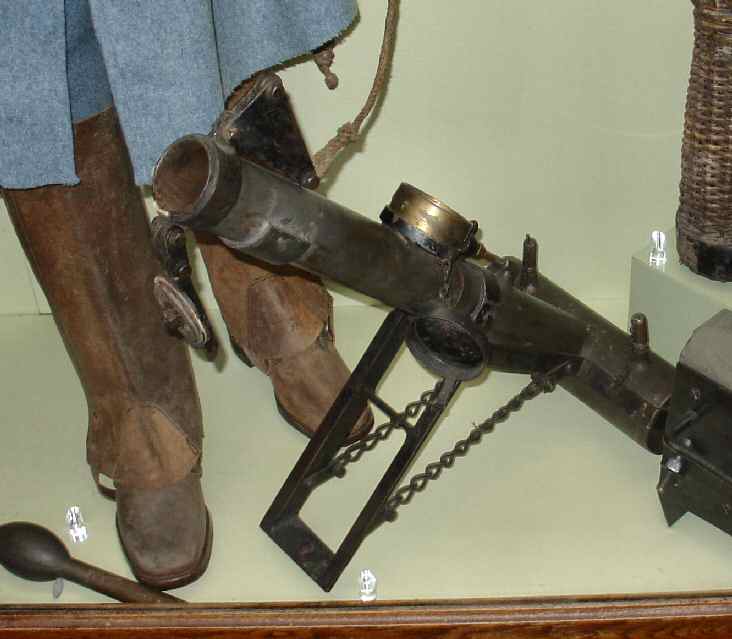
- 50 mm Pneumatic mortar Dormoy-Chateau.jpg (32.75 KiB) Viewed 26261 times
hectmarr wrote:You have to make many weapons, because this field is long and short life
-
jackssmirkingrevenge
- Five Star General

- Posts: 26216
- Joined: Thu Mar 15, 2007 11:28 pm
- Has thanked: 576 times
- Been thanked: 347 times
Fri Mar 25, 2011 3:39 am
It's certainly the one that looks most like a spudgun

The 50mm one reminds me of
this design.
I think it's fascinating that in an age when solid propellant artillery was well developed and desensitised explosives could be fired from conventional guns (removing the need for weapons like the
Zalinski Dynamite Gun), these devices were still considered to be viable weapons.
The static nature of trench warfare must have made the relative bulk of a pneumatic setup less of an issue, and the shot is of course both flashless and smokeless, so it is less likely to betray the position of the mortar. Still, I don't suppose it was noiseless - over 500 psi from a "valveless" pneumatic with a 5 inch bore must have made an impressive bang!
hectmarr wrote:You have to make many weapons, because this field is long and short life
-
LeMaudit
- Corporal 2

- Posts: 665
- Joined: Thu Apr 16, 2009 2:48 pm
Fri Mar 25, 2011 7:28 am
Interesting

I missed the 1st tread also.
The link from the French forum claim that they were massively used during the trenches war.
But I am not sure they were so common on the field; I have a big French book from 1923 named "Les Canons de la Victoire" (The Victory Cannons) full of drawings and descriptions for common guns and mortars, both heavy and light, and after a quick look I couldn't find a single mortar listed that operate with air pressure.
Now I need to explore all those interesting links

BTW guys is you need some help for French translation, don't hesitate to ask me, I'll be glad to help.
-
jackssmirkingrevenge
- Five Star General

- Posts: 26216
- Joined: Thu Mar 15, 2007 11:28 pm
- Has thanked: 576 times
- Been thanked: 347 times
Fri Mar 25, 2011 8:27 am
LeMaudit wrote:I have a big French book from 1923 named "Les Canons de la Victoire" (The Victory Cannons) full of drawings and descriptions for common guns and mortars, both heavy and light, and after a quick look I couldn't find a single mortar listed that operate with air pressure.
Sounds like an interesting item, is it original?
If you need some help for French translation, don't hesitate to ask me, I'll be glad to help.
Just one thing, is my interpretation of how the mortars work accurate?
hectmarr wrote:You have to make many weapons, because this field is long and short life
-
LeMaudit
- Corporal 2

- Posts: 665
- Joined: Thu Apr 16, 2009 2:48 pm
Fri Mar 25, 2011 8:49 am
Yes it's an original book. Lots of detailed drawings in it

Love that!! 8)
I don't see any indication that the Brandt 60mm is a coaxial... it's a CO2 gun

The web site is supposed to have English translation, but it doesn't seem to be available for those mortars.
Interesting subject, I'll grab what I can find here and there, and make an English translation from the various French description.
-
POLAND_SPUD
- Captain

- Posts: 5402
- Joined: Sat Oct 13, 2007 4:43 pm
- Been thanked: 1 time
Fri Mar 25, 2011 10:08 am
@MrCrowley
Lol I agree
Picture 60mm brandt mortar.jpg should have a caption >>
Spudgun moth########! Do you has it ?!?
@JSR
Something tells me that you want a full scale large bore pneumatic... yeah I know you live in a densely populated area....
Don't you have a jeep

?
It would look cool with a 120 mm pneumatic mortar Brandt-Lhuillier mounted on the roof
Children are the future
unless we stop them now
-
jackssmirkingrevenge
- Five Star General

- Posts: 26216
- Joined: Thu Mar 15, 2007 11:28 pm
- Has thanked: 576 times
- Been thanked: 347 times
Fri Mar 25, 2011 11:40 am
LeMaudit wrote:Yes it's an original book. Lots of detailed drawings in it

Love that!! 8)
Very nice, was it purchased or inherited?
I don't see any indication that the Brandt 60mm is a coaxial
How about the
diagram 
POLAND_SPUD wrote:Something tells me that you want a full scale large bore pneumatic...
I don't think I could go back to pneumatics after going hybrid, if only in terms of power.
yeah I know you live in a densely populated area...
Actually, that complaint indicates a lack of imagination - a big bore like this could easily reduce population density

Don't you have a jeep

?
Yes, yes I do.
It would look cool with a 120 mm pneumatic mortar Brandt-Lhuillier mounted on the roof
Yes, yes it would

-
Attachments
-
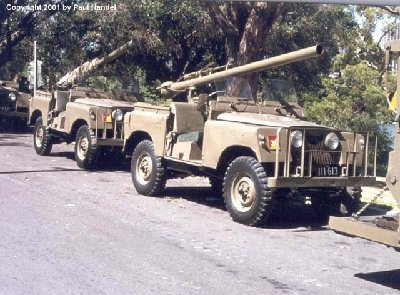
hectmarr wrote:You have to make many weapons, because this field is long and short life
-
LeMaudit
- Corporal 2

- Posts: 665
- Joined: Thu Apr 16, 2009 2:48 pm
Fri Mar 25, 2011 11:49 am
jackssmirkingrevenge wrote:
Very nice, was it purchased or inherited?
I swapped it for my French Army medal

jackssmirkingrevenge wrote:
I don't see any indication that the Brandt 60mm is a coaxial
How about the
diagram 

Embarrassing...
I'm working on the translations

You'll do the proof-reading

-
Hotwired
- First Sergeant 3

- Posts: 2599
- Joined: Fri Oct 13, 2006 5:51 am
- Location: UK
Fri Mar 25, 2011 7:37 pm
Do not like the 50mm mortar.
You'd have to dump a barrel of compressed air just to fire the projectile.
-
Zeus
- Staff Sergeant

- Posts: 1505
- Joined: Tue Oct 27, 2009 7:34 pm
- Location: 'Straya, C*nt
Fri Mar 25, 2011 8:01 pm
Although the inefficiency of the first design is quite obvious, it seems to have some potential, it certainly seems to be simple enough and the performance would be reasonable.
The second certainly needs a caption, though it's the most "conventional", if I'm not very much mistaken, JSR made something of that ilk. A mechanically piloted coax that is.
/sarcasm, /hyperbole
-
jackssmirkingrevenge
- Five Star General

- Posts: 26216
- Joined: Thu Mar 15, 2007 11:28 pm
- Has thanked: 576 times
- Been thanked: 347 times
Fri Mar 25, 2011 9:47 pm
Zeus wrote:The second certainly needs a caption, though it's the most "conventional", if I'm not very much mistaken, JSR made something of that ilk. A mechanically piloted coax that is.
You mean
this one? Same concept but I dare say the mortar is slightly better engineered

Edgar Brandt was
quite a guy by the way, it was his efforts that allowed the British to perfect the APDS shell in WW2.
Hotwired wrote:Do not like the 50mm mortar.
You'd have to dump a barrel of compressed air just to fire the projectile.
This is what
this basic diagram of the device suggests. I remember a Junkyard Wars episode where they made a bowling ball cannon with a burst disk at the muzzle *cringe*
Here's how I would make it, much more efficient and the hollow tail also provides stability:
-
Attachments
-

- muzzlecapmortar.gif (12.5 KiB) Viewed 26054 times
hectmarr wrote:You have to make many weapons, because this field is long and short life
-
MrCrowley
- Moderator

- Posts: 10078
- Joined: Fri Jun 23, 2006 10:42 pm
- Location: Auckland, New Zealand
- Been thanked: 3 times
Fri Mar 25, 2011 10:59 pm
Just read that other thread...
Lobbing a 4.5kg projectile over a kilometre with 35 bar is certainly impressive performance...
How the hell did they lob a 4.5kg projectile that far with only 35 bar???

-
jackssmirkingrevenge
- Five Star General

- Posts: 26216
- Joined: Thu Mar 15, 2007 11:28 pm
- Has thanked: 576 times
- Been thanked: 347 times
Fri Mar 25, 2011 11:20 pm
MrCrowley wrote:How the hell did they lob a 4.5kg projectile that far with only 35 bar???

- no valve ∴ zero "opening time" and no restrictions - instantaneous maximum flow
- the projectile is not a potato or tennis ball, but a reasonably streamlined shell with high sectional density ∴ velocity is lost at a much lower rate
- "only 35 bar" acting on a 12cm projectile is a force of (literally lol, I got 9021)
just OVER 9000 POUNDS!!!! 
It wasn't exactly a record breaker either, here are the specs for the 20cm
Luftminenwerfer:
Austro-Hungarian Mortars in WW1 wrote:The 3 meter long barrel was fixed at a elevation of 45 degrees. During the time the bulbous air chamber was filled with pressurized air, the projectile was held in place using a sort of clutch, which was released when the pressure was correct (max 55 atmospheres) and the aiming was done.
Then the projectile (22.6 or 34.4 kilos) was forced out, reaching a maximum range of some 1,460 meters.
hectmarr wrote:You have to make many weapons, because this field is long and short life






